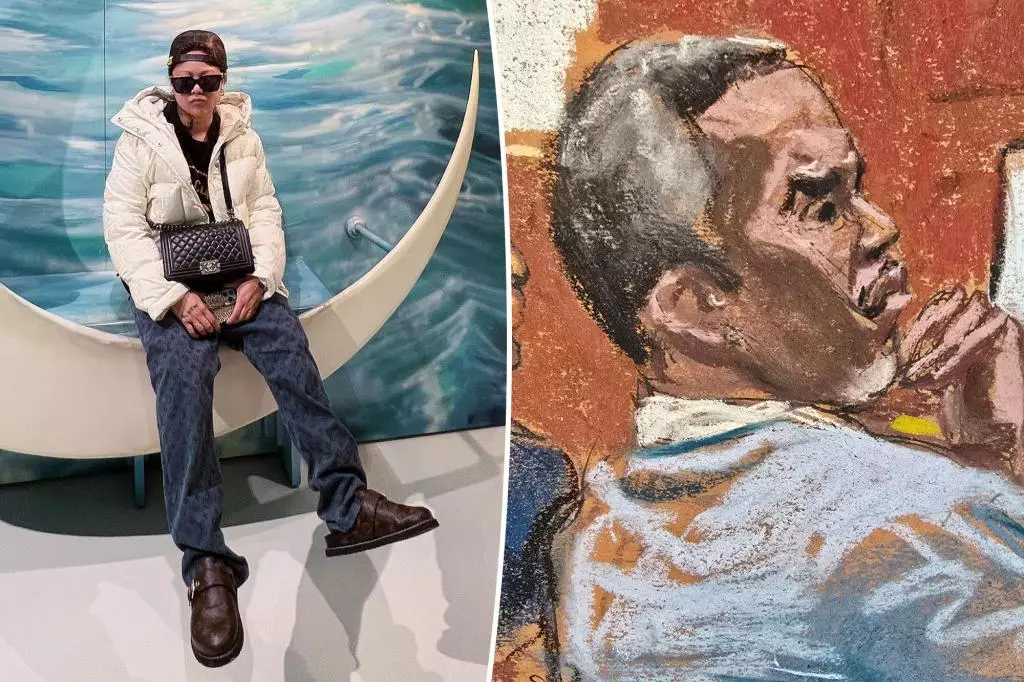In a courtroom filled with tension, fashion designer Bryana “Bana” Bongolan’s testimony stunned many as she recounted a harrowing experience that allegedly unfolded on a high-rise balcony in September 2016. The allegations against Sean “Diddy” Combs depict a man whose public persona of success and charisma starkly contrasts with the violent accusations made against him. Bongolan claimed that during an encounter at Combs’ then-girlfriend Casandra “Cassie” Ventura’s condo, she was physically lifted and dangled over the edge, an event that left both physical and psychological scars. An unsettling assertion that speaks volumes about power dynamics and abuse in both personal and professional arenas.
Bongolan, petite in stature and significantly lighter than Combs, described her instinctive struggle for safety amidst the threatening situation. Her claim that he shouted at her, “You know what the f–k you did,” showcases not only aggression but also a troubling psychological tactic often used by abusers: the demand for accountability from the victim rather than acknowledging their own violent behavior. This incident is not isolated; it serves to underline a broader narrative of abuse that makes one question the fragility of personal safety even within ostensibly glamorous lives.
The Aftermath of Trauma
The effects of such traumatic experiences cannot be understated. Bongolan testified to experiencing night terrors and paranoia, illustrating the long-term psychological impact that trauma can impose on an individual. Unlike physical wounds, emotional and psychological scars often go unnoticed, yet they can alter one’s life irrevocably. The awareness of living in fear can lead to pervasive anxiety, resulting in a constant cycle of distress that pushes individuals to seek justice—but often at great personal cost.
The case against Diddy is layered with complexity. As Bongolan pursues a civil suit for sexual battery and false imprisonment, the broader implications of this lawsuit ripple through societal conversations about power, consent, and accountability within the entertainment industry. In a world where victims frequently face skepticism, Bongolan’s determination illustrates a significant trend of survivors taking a stand against their abusers, igniting discussions about the necessary transformation within a culture that has, too often, prioritized silence over justice.
A Pattern of Intimidation
Bongolan’s testimony is not an isolated incident but rather part of a series of accusations that paint Combs as a man with a troubling past regarding anger management and abusive behavior. The corroboration of Ventura’s own experiences raises alarms about a longstanding pattern of intimidation and violence in his relationships. Ventura’s testimony about physical assaults coupled with Bongolan’s recollections of witnessing Combs’ threatening behavior—such as throwing a knife in her direction—deepen the narrative of a man whose success may have built a shield against accountability.
Moreover, the inclusion of witness testimonies from former assistants adds texture to the claims, reinforcing the idea that this is not an isolated view but rather a shared sentiment among those who have interacted with Combs throughout the years. The previous threat made against assistant Capricorn Clark because of her connections to a rival paints a chilling picture of a man not just concerned with his public persona but willing to use fear as a tool to maintain control.
Legal Implications and the Pursuit of Justice
The repercussions of these allegations extend far beyond the current legal battles. Diddy’s ongoing battles with the law, underscored with charges of sex trafficking, racketeering, and transporting individuals for prostitution, have far-reaching consequences. The juxtaposition of Diddy’s commercial success against the backdrop of serious legal charges disrupts any romanticized notions of the entertainment industry’s allure. It creates a narrative that demands scrutiny, not only regarding the actions of individuals but also about a broader culture that often grants them impunity.
While Diddy claims innocence, the legal proceedings become a stage for dismantling a carefully cultivated image. The courtroom serves as an arena where survival, power, and the quest for justice intersect, and victims like Bongolan step into the light in hopes of reclaiming their narrative against pervasive abuse.
Ultimately, the unfolding saga invites all of us to engage in a necessary dialogue surrounding abuse, power, and the often-hidden struggles of those seeking justice in a world that sometimes prefers silence over truth. The revelations challenge us to consider how we define success and the moral compass that guides those who wield power in our society.


Leave a Reply